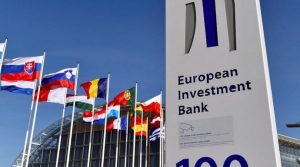
The European Investment Bank (EIB) is ready to provide funds to Ukraine to implement energy and energy saving projects if the risk factors can be controlled, Head of the EIB Resident Representation for Ukraine Jean-Erik de Zagon said.
He said that the EIB is ready to provide the funds if the Ukrainian government can convince the bank of the economic viability of the potential projects. .
He said at the 11th Energy Day organized by the European-Ukrainian Energy Agency on Thursday.
At the same time, the Head of the EIB Resident Representation in Ukraine said that the bank sees many opportunities for cooperation with the government of Ukraine, specifying that “the EIB in Ukraine has a portfolio totaling EUR 6.5 bln. It includes many project in energy sector, social and economic infrastructure, transport and connectivity, local private sector development, and innovation. ”
At the same time, according to de Zagon, with regard to international projects on energy efficiency, Europe highly values a clearly defined time frame for achieving climate change.
Speaking about projects that may be of interest to the bank in the future, he pointed out among the others the need to develop bioenergy. As for the diversification of projects, it is likely that biomass will deserve new attention. It is one of the decarbonization tools. It is challenging, but this is the need to process those resources that are raw materials for renewable energy in Ukraine, de Zagon said.
He also focused on that Ukraine has a good existing gas transmission system (GST). It offers a vast potential where development is most necessary by ensuring that the transmission system is supportive of renewable energy (like transport of hydrogen) the EIB representative said.
At the same time, he explained what donors pay attention to when making decisions on financing certain projects and what Ukraine needs to take into account and do in order to receive international funding. This is about the need to balance positions on the energy market and promote legislative initiatives so that legislation of Ukraine met European requirements and standards, he said.
As for the National Action Plan, the EIB is pleased to cooperate with the government of Ukraine in its implementation, de Zagon said.
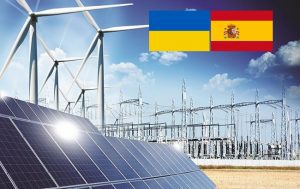
Ukraine and Spain will strengthen cooperation in the fields of energy, digital economy and healthcare, Ukrainian Foreign Minister Dmytro Kuleba has said.
“We talked about energy, digital economy, and healthcare. These are the areas in which Ukraine and Spain will soon be very actively deepening interaction in the interests of our peoples,” the Ukrainian Foreign Minister said at a joint press conference with the Spanish Foreign Minister in Madrid.
Kuleba also explained the meaning of four documents signed earlier by Ukraine and Spain during his visit.
“We have signed four important documents that meet the interests of both Ukraine and Spain. The convention on avoidance of double taxation will help attract Spanish investments in Ukraine. The convention on cooperation in the customs sphere will facilitate trade between our countries. The memorandum of understanding in the field of agriculture will strengthen our agricultural trade,” he added.
At the same time, Kuleba recalled that Spain is “number one importer of Ukrainian grain in Europe.”
Also, Ukraine and Spain signed a memorandum in the field of cybersecurity.

Ukraine’s Foreign Minister Dmytro Kuleba and Foreign Minister of Romania Bogdan Aurescu have agreed to establish a joint working group on cooperation in the energy sector.
“We discussed in detail the ambitious potential projects in the energy sector, primarily those related to electricity, gas and hydrogen. We decided to create a working group on energy issues and look forward to when our colleagues from the ministries of energy of Ukraine and Romania and the involved business companies will start a detailed substantive conversation on the issues that I have mentioned,” Kuleba said at a joint press conference with Aurescu in Bucharest.
He also noted that he had discussed with his Romanian colleague how to launch the Isaccea-Orlivka ferry service at a maximum capacity.
“I am absolutely sure that we can, we have every opportunity to create and implement ambitious projects that will make Ukraine, Romania, and our region as a whole stronger. It would be an unacceptable mistake not to use the opportunities that we have, primarily in energy and infrastructure sectors. And so today we’ve really discussed how we can launch the Isaccea-Orlivka ferry line at a maximum capacity and eliminate certain problematic issues,” the Ukrainian minister added.
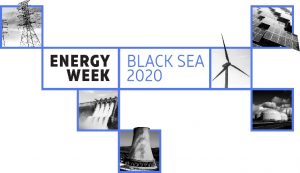
Free Online Session dedicated to the Ukrainian renewable energy crisis will be held on 28th May within the framework of Energy Week Black Sea 2020.
Due to the lucrative feed-in tariffs introduced in 2009, Ukraine has achieved remarkable progress in mobilising sizable private sector investments in the energy sector and becoming one of the fastest–growing renewables markets in Europe. In 2019, renewable energy deployment saw a record growth to 4 250 MW compared to the installed capacity of only 743 MW in 2018.
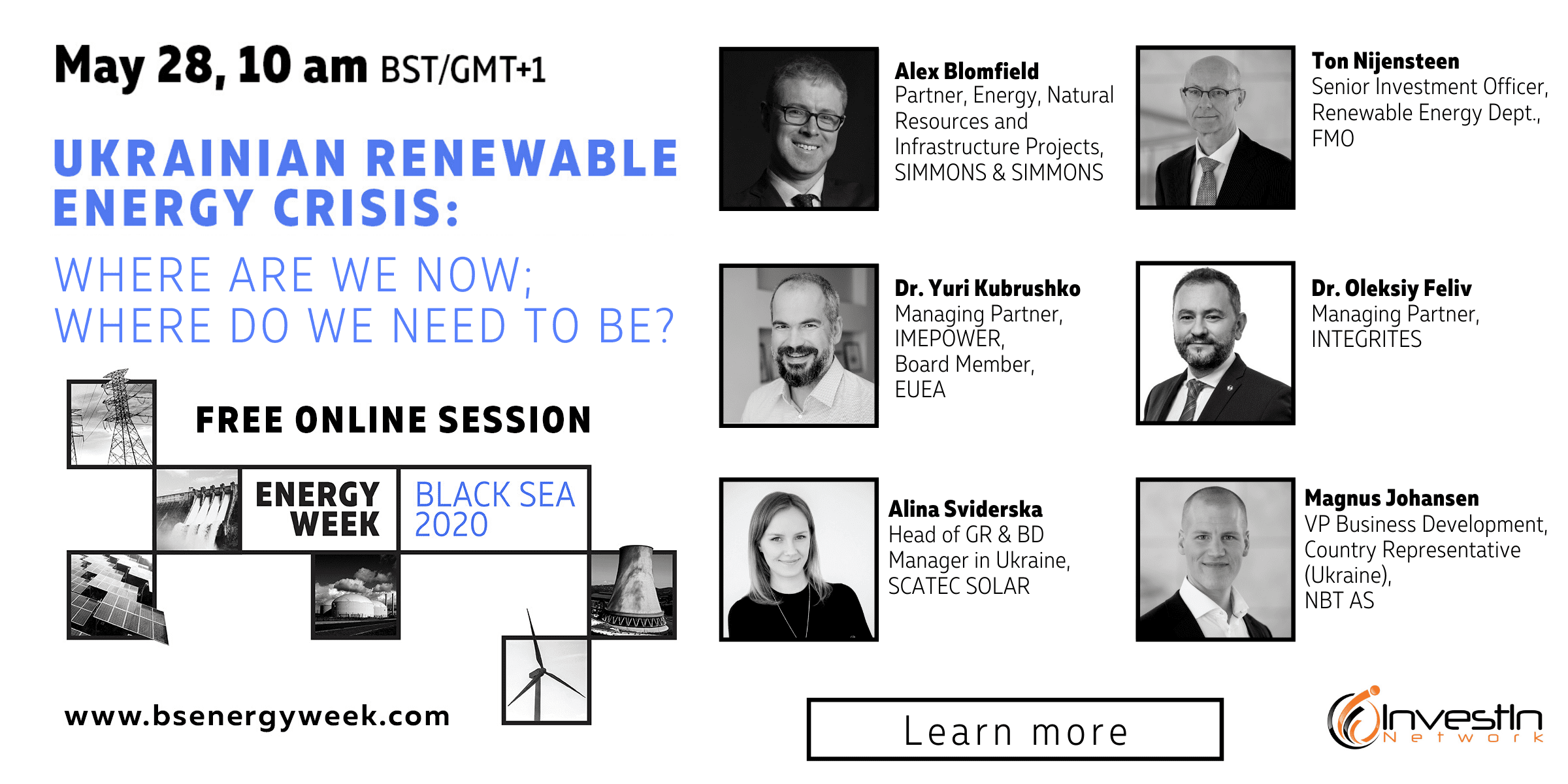
However, the recent developments, and, in particular, the initiative of the government to cut the feed-in tariff for wind and solar energy producers can change the outlook and turn the Ukrainian renewables success story into an illustration of why the state is not ready for foreign investment.
In December 2019, bill No. 2543 on improving the investment climate in the renewable energy sector was registered in Ukraine’s parliament. The bill proposes a voluntary restructuring of FIT with a simultaneous extension of the terms for their payment and a reduction in the terms of preliminary power purchase agreements (pre-PPA).
The following negotiations which have now lasted for six months failed to produce a compromise solution acceptable to both Ukrainian authorities and domestic and foreign investors. The key issues are still open, namely restructuring of power purchase agreements and feed-in tariffs, the release of capacity for wind energy investors for the benefit of future auctions, balancing responsibility and compensation for curtailments of wind and solar producers.
Online Session “Ukrainian Renewable Energy Crisis: Where Are We Now; Where Do We Need To Be?” is organised to address the situation and discuss the following questions:
What should be the state’s immediate steps in resolving the renewable energy crisis?
What are the most practical solutions and stabilisation measures acceptable for foreign investors?
How will Ukraine continue attracting investors in global competition? Are “green” auctions attractive enough?
What will be the pace of renewable energy project commissioning post-FIT?
What are the possibilities for addressing intermittency and energy security? How does the transition meet the need for continuous supply in the absence of storage? How should energy storage be supported?
Free Registration: https://www.bsenergyweek.com/online-session/
Open4business – media partner of Online Session «Ukrainian renewable energy crisis: Where are we now; where do we need to be?»
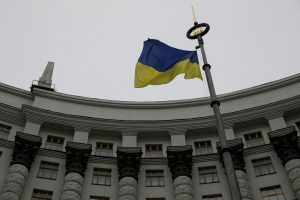
The Ministry of Energy and Environmental Protection of Ukraine will be divided into two relevant departments, Prime Minister of Ukraine Denys Shmyhal has said.
“The separation of the ministry and the creation of the post of the profile minister of ecology are on the agenda,” he said in an exclusive interview with Interfax-Ukraine, emphasizing that the previous merger of the ministries did not produce the expected effect.
“It was strange for me when I got to the first meetings of the Cabinet of Ministers, when the minister of energy first reported on the state of affairs in the nuclear energy industry, then the coal industry, and then on the Red Book plants and catch of bloodworms. Since then, I have been a supporter of the idea that a professional ecologist should be involved in ecology, to whom it is close and who lives with it,” Shmyhal said.
As reported, in August 2019, the Verkhovna Rada supported the candidatures for the posts of members of the new Cabinet of Ministers of Ukraine. By this decision, the Minister of Energy and Environmental Protection of Ukraine was appointed. Prior to this, the government had two separate ministries: the Ministry of Energy and the Ministry of Ecology.
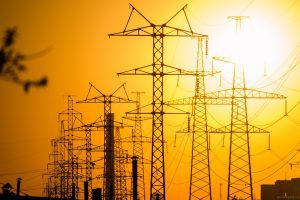
Myronivsky Hliboproduct (MHP) has announced the start of construction of a 25 MW Battery Energy Storage System (BESS) in Ladyzhyn, Vinnytsia region, this year.
According to a press release by MHP, the agricultural holding began implementing a conceptual project for the construction of the Energy Storage in Vinnytsia region as part of the creation of the energy cluster MHP Energy Hub. The implementation of energy projects of the agricultural holding is carried out by PrJSC MHP Eco Energy, which is an electricity supplier and a management company of the largest biogas energy producers in Ukraine.
“The first step of MHP Eco Energy is announcing a tender for the development of a feasibility study for connecting BESS to power grids, with the possibility of using Smart Grid Technologies in the future,” MHP said.
According to MHP, the implementation of the project for the construction of BESS with a capacity of 25 MW in Ladyzhyn will begin in 2020 and will take place in four stages: the first one of 5 MW/5MWh, the second of 5 MW/5 MWh (the total capacity of 10 MW/10 MWh), the third of 5 MW/5 MWh (the total capacity of 15 MW/15 MWh), the fourth one of 10 MW/10 MWh (the total capacity of 25 MW/25 MWh).
“Ukraine needs to reduce its dependence on “dirty” energy and very quickly upgrade its energy infrastructure through the use of Energy Storage and Smart Grid in order to remain economically competitive and energy independent. The accumulation of energy will allow us to have a power supply that will be available 24/7. Energy storage plays an important role in creating a more flexible and reliable system of operation of power grids,” MHP noted.